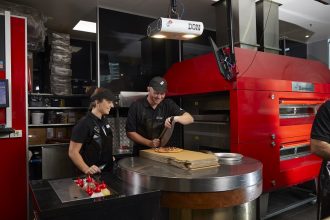Burger King has stopped accepting contactless payments, citing high service charges from banks and card companies. A Burger King spokesman said that the switch was due to “exorbitant bank charges,” but wouldn’t comment further.
"Merchant service fees in New Zealand are too high," said Greg Harford, general manager of public affairs for Retail NZ. "There's no obvious reason for charges here to be two or three times more than in Australia or the UK."
Burger King isn’t the first company to react to the high charges – in January, Ripe Coffee Roasters in Wellington introduced a 2 percent surcharge on all PayWave transactions. Surcharges for credit card payments are also commonplace around the country.
Part of the problem was due to lack of regulation of maximum interchange fees, Hartford explained.
"Visa and Mastercard have both taken steps in recent months to reduce some interchange rates, but there hasn't been enough time to assess how much the interchange reductions have impacted overall merchant service fees paid by retailers," he said. "We expect that, even with the changes, rates in New Zealand will still be higher than in Australia and the UK."
New Zealand retailers are paying on average 1.2 percent for contactless payments, while in Australia they pay 0.6 percent and 1.2 percent in the UK.

In a speech to the Payments NZ Conference last month, Minister of Commerce and Consumer Affairs Kris Faafoi acknowledged that while they adversely impact smaller businesses, both Visa and Mastercard had taken steps in 2018 to make interchange rates fairer.
“I do not think further increases are in the interests of consumers or the wider economy,” Faafoi said. “I have chosen not to go down the route of Australia or the European Union in respect of regulating interchange fees. However, that option remains very much on the table, particularly if I were to see fees increase again.” He also demanded an ongoing commitment from banks and schemes to increase the transparency of costs associated with retail payments and continuing to educate merchants.
A report from the Commerce Commission in 2013 concluded that interchange fees would continue to rise but didn’t find any reason to intervene, opting to recommend “alternative regulatory intervention.”
Retail NZ estimates the hidden cost of payment systems to be around $380m every year, and forecast a rise to $711 million by 2025. However, the Bankers Association disputes these numbers. “Whether or not retailers choose to pass those costs on to consumers is up to them,” said chief executive Karen Scott-Howman. “It’s inaccurate to say that all retailers raise their prices to cover those costs. Some may do so, while others may absorb it as a cost of doing business.” She also noted that countries where fees have been regulated saw no reductions passed on to the consumer.
First Retail Group managing director Chris Wilkinson said that contactless payments were now an expected part of the retail landscape. "It's expected now and it's interesting that businesses that don't have it almost apologetically advertise that they don't with big signs that say 'no contactless'," he said.
He didn’t, however, think that Burger King would be adversely impacted by the change. "Customers will be frustrated, but in terms of goodwill or relationship, I doubt that will have a massive impact."
So far there is no indication that other fast food retailers will follow suit. McDonald’s head of communications Simon Kenny said that McDonald’s currently has no plans to stop offering contactless payments for their customers.
“That said, we’ve supported Retail NZ’s approach to government to look at merchant fees,” he said. “As with any cost to our business, merchant fees are factored into our pricing, and are reviewed to look at ways we can continue to offer our customers good value for money.”






